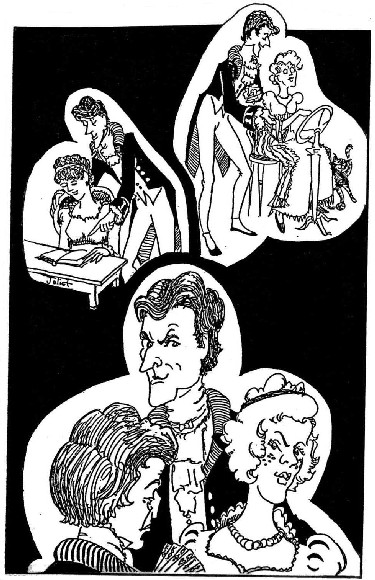|
William Walter Elliot to Colonel Wallis 8 Sydney-place. February 3 My dear Wallis, My man is returning to Marlborough Buildings the elegant toothpick-case which you carelessly left behind last evening – and which is so handsome an object that I am sadly tempted to deny any knowledge of its whereabouts. Your sly smiles at last night’s stupid little party did not go unremarked – occasioned, no doubt, by the sight of Mr William Elliot of Nowhere-in-Particular playing humble and gracious host to the Elliots of Kellynch-hall and the Dalrymples of Cloncaven, County Clare. You would be even more hugely entertained were you to witness this same amateur’s continuing performances en famille at Camden-place. I flatter myself that I might now confidently offer myself for a part in one of Mr Sheridan’s plays at the Theatre Royal. I fancy the role of energetic philandering lover to no fewer than three women at once. What say you? Allow me to set the scene for you: 12 Camden-place. “The smaller of the two drawing-rooms, but not so very small neither.” (I quote Miss Elliot) Sir Walter Elliot and Mrs Penelope Clay seated at the card-table. He, yawning; she, bright-eyed, solicitous, alert. Miss Elizabeth Elliot seated by the fire, industriously plying her needle on a peculiarly ugly screen. Miss Anne Elliot sitting quietly on a sopha by the windows with a copy of Cecilia to which she refers from time to time as discourse languishes and dies, as it frequently does. The gallant Mr William Elliot constantly moving, roams easily about the room, unobtrusively and generously making love to them all.
Mr E. “What a charming design, Miss Elliot.” Pause to admire. “I have always observed that there can be nothing more graceful and soothing than the poise and motion of a lady’s wrists as she draws a needle through the fabric. May I hand you the silks? What is to be next – the apricot or the gold?” He advances to sit by Miss Anne. A gesture to her novel and a few murmured remarks on the characters, deploring the villainous artifice of Mr Monckton and exchanging views on the motives of the Delviles: “. . . arrogant, certainly, but do you not agree that a consciousness of centuries of birth, breeding and responsibility must to some degree excuse – or at least explain – the family’s pride and prejudice? More tolerable surely, my dear cousin, than the insinuating aspirations to high connexion of those of lower station . . .?” A meaning glance across the room. He strolls over to the card-table, taking a stance behind Sir Walter’s chair in time to offer congratulations on a winning hand, and simultaneously exchange warm conspiratorial smiles with Mrs Clay . . . (The performance continues, and may be seen at least three evenings in a week. I recommend it as a spectacle, my dear Wallis. Much cheaper than a box at the Royal to see Mr Macready play Romeo.) As a military man of some experience, you will recognize my strategy and applaud my tactics: to keep Miss Elliot in anticipation of an eventual declaration, to convince Miss Anne of the sincerity of my attraction, and to allay the jealous fears of Mrs Clay with gentlemanly disclaimers and protestations. And all this under the aquiline nose of Sir Walter, who never sees beyond his own reflection. I must concede, however, that the arrival of Miss Anne Elliot in Bath has somewhat complicated the simplicity of my original design. Who would have thought that the glances of those fine dark eyes at Lyme could have so disarmed and distracted
Yours etc.
|

